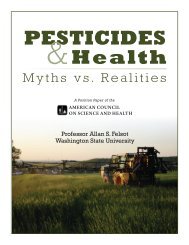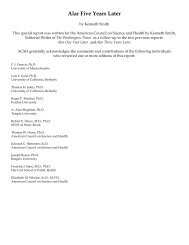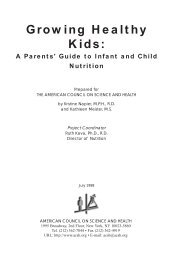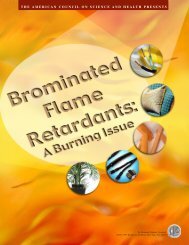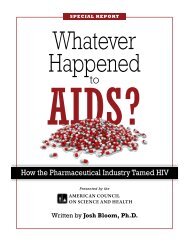The Role of Beef in the American Diet - International Meat Secretariat
The Role of Beef in the American Diet - International Meat Secretariat
The Role of Beef in the American Diet - International Meat Secretariat
Create successful ePaper yourself
Turn your PDF publications into a flip-book with our unique Google optimized e-Paper software.
<strong>The</strong> <strong>Role</strong> <strong>of</strong> <strong>Beef</strong> <strong>in</strong> <strong>the</strong> <strong>American</strong> <strong>Diet</strong><br />
18<br />
Inconsistent F<strong>in</strong>d<strong>in</strong>gs<br />
In 1997, <strong>the</strong> World Cancer Research Fund published a comprehensive<br />
review <strong>of</strong> <strong>the</strong> scientific evidence on diet and cancer, which ranked<br />
various l<strong>in</strong>ks between specific foods and cancer as “conv<strong>in</strong>c<strong>in</strong>g,” “probable,”<br />
or “possible.” <strong>The</strong> most notable conclusion <strong>of</strong> this report was that<br />
<strong>the</strong>re was “conv<strong>in</strong>c<strong>in</strong>g” evidence that ample <strong>in</strong>takes <strong>of</strong> vegetables and<br />
fruits reduce <strong>the</strong> risk <strong>of</strong> a variety <strong>of</strong> cancers; that conclusion rema<strong>in</strong>s<br />
valid today. More tentatively, <strong>the</strong> report concluded that <strong>the</strong>re was a<br />
“probable” l<strong>in</strong>k between high <strong>in</strong>take <strong>of</strong> red meat and <strong>in</strong>creased risk <strong>of</strong><br />
colon cancer, and “possible” l<strong>in</strong>ks between red meat and breast and<br />
prostate cancers (33).<br />
S<strong>in</strong>ce 1997, additional scientific studies have been completed, with<br />
<strong>in</strong>consistent results. One recent expert review noted that <strong>the</strong> majority <strong>of</strong><br />
additional studies <strong>of</strong> colon cancer published s<strong>in</strong>ce 1997 have not associated<br />
meat <strong>in</strong>take with <strong>in</strong>creased risk; thus, <strong>the</strong> weight <strong>of</strong> evidence perta<strong>in</strong><strong>in</strong>g<br />
to colon cancer may be weaker than <strong>the</strong> “probable” status it had<br />
<strong>in</strong> 1997 (34). A recent comb<strong>in</strong>ed analysis <strong>of</strong> eight major breast cancer<br />
studies found no association between red meat <strong>in</strong>take and <strong>the</strong> risk <strong>of</strong><br />
this type <strong>of</strong> cancer (35). In fact, <strong>the</strong>re is little conv<strong>in</strong>c<strong>in</strong>g evidence for<br />
an association <strong>of</strong> any specific dietary factors with breast cancer risk,<br />
although obesity may play a role (36). Uncerta<strong>in</strong>ties also rema<strong>in</strong> with<br />
regard to prostate cancer; <strong>the</strong> evidence for a l<strong>in</strong>k with dietary factors is<br />
still considered tentative ra<strong>the</strong>r than conclusive (37).<br />
Until more is learned about <strong>the</strong> relationship between cancer risk and<br />
specific dietary factors such as red meat <strong>in</strong>take, moderation ra<strong>the</strong>r than<br />
drastic dietary change is <strong>the</strong> best course <strong>of</strong> action. A well-balanced diet<br />
that <strong>in</strong>cludes reasonable amounts <strong>of</strong> foods from all <strong>the</strong> major food<br />
groups, without excessive <strong>in</strong>takes <strong>of</strong> saturated fat or total calories, is <strong>the</strong><br />
most prudent choice.<br />
Substances Produced by Cook<strong>in</strong>g<br />
Concerns have been raised about <strong>the</strong> presence <strong>of</strong> substances called<br />
heterocyclic am<strong>in</strong>es <strong>in</strong> some cooked meat and poultry, <strong>in</strong>clud<strong>in</strong>g beef.<br />
Laboratory experiments have shown that heterocyclic am<strong>in</strong>es can cause<br />
mutations <strong>in</strong> a cell’s genetic material and that, like many o<strong>the</strong>r mutagens,<br />
heterocyclic am<strong>in</strong>es can cause cancer when fed to laboratory animals<br />
<strong>in</strong> very high doses (38).<br />
Heterocyclic am<strong>in</strong>es are formed when components <strong>of</strong> prote<strong>in</strong>s react<br />
with ano<strong>the</strong>r substance, called creat<strong>in</strong>e, when subjected to <strong>in</strong>tense heat<strong>in</strong>g.<br />
This reaction is almost entirely limited to muscle foods (meats)<br />
because most o<strong>the</strong>r foods do not conta<strong>in</strong> creat<strong>in</strong>e. Heterocyclic am<strong>in</strong>es



